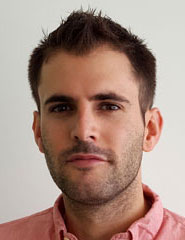Alumni
 |
Entrepreneurial Alumni

Gregory Brill
Posted 01 September 2016
London Program
March 2010 Intake
Gregory Brill (London, March 2010), a graduate of Washington & Lee University (BA) and Cornell University – Johnson Graduate School of Management (MBA in Technology), is the Co-Founder of Thread Learning a lead tablet application startup for teachers working with autistic and special needs children. The application improves efficiency & quality of care by allowing critical data collection and analysis to be done electronically. Thread Learning has secured its first beta user, Hawthorne Foundation (500employee/400-student organization for children with autism).
Gregory got his first inspiration for his business idea during his time on the Programme in London where he realized that he loved technology and that he wanted this to be his career focus. His interest in autism and special needs came through his volunteering activities.
Describe your business and your role within it.
Thread Learning builds a free tool that allows autism teachers to collect, analyze and share student progress data. Autism education will be almost entirely digital in 10 years and Thread will help teachers, parents, clinicians and therapists to utilize digital tools and coordinate care. I founded Thread Learning along with my co-founder Sam Raudabaugh. I act as CEO and handle the business side of things, while Sam handles (and is spectacular with) the technology side.
How did you get into this line of business?
The first time I ever tried my hand at technology was during my time with the Mountbatten Programme. I tried to launch a social media application dealing with photo sharing. The truth was that at the time I didn't have the skills I needed to found a tech startup, but regardless I realized that I loved technology and that I wanted technology to be my career focus. I gained a lot of experience and perspective from my time with the Mountbatten Programme.
I got into autism and special needs through volunteering - I've always felt some of the highest impact work you can do involves children. I've led projects to revitalize public schools and led volunteers tutoring SATs to underprivileged youth, but some of the most rewarding work I've done centers around special needs. I started volunteering in autism about 10 years ago and over that time I've realized that we aren't giving teachers and therapists the tools they need. I set out to change that.
How did you go about setting it up and getting established?
We began by talking to potential customers to better understand the problem and to prototype solutions. One of those potential customers, Hawthorne Foundation became our partner and first institutional beta tester. Second, we started meeting with experts in areas we didn't fully understand and many of those experts became advisers. Finally, we spun out from Cornell Tech, a New York based graduate school for technology. Cornell Tech has been fantastic helping us get established quickly - they invested $100K in us after winning a startup awards contest.
What else is in the pipeline?
We will be releasing our first product in the next several months, as well as putting together a second funding round based on the traction from our beta and from our public release. Feel free to contact me if you are interested in learning more.
What has been the proudest moment in your working life thus far?
The proudest moment was when I put the product we had built over the course of hundreds of hours in front of an autism teacher and their eyes lit up and they asked when they could use it.
The reason I got into technology is because I wanted to change the world and I wanted to build something special. I haven't changed the world yet, but I've started building something I can be proud of.
What has been your biggest mistake/learning experience?
I made a lot of mistakes when I tried my first photo sharing startup. My first mistake was that I was working full time in finance and a startup needs your full attention. Second, I chose to solve a really hard problem with a two-sided market complication. Third, I outsourced development and I didn't have the skill set to properly manage the technology build. However, I learned so much from that experience that I wouldn't take it back if I could.
Any words of advice/wisdom would you impart to others thinking of setting up their own business?
I can speak more to tech startups more than other types of businesses. My advice is that you need to immerse yourself in technology in order to find people who share your passion, intelligence and drive. Single founder startups rarely succeed and choosing a co-founder is the most important decision you will make.
Gregory J. Brill
Office: (973) 544-8415
Mobile: (703) 597-2542
greg@threadlearning.com
Co-Founder of Thread Learning
www.threadlearning.com
|